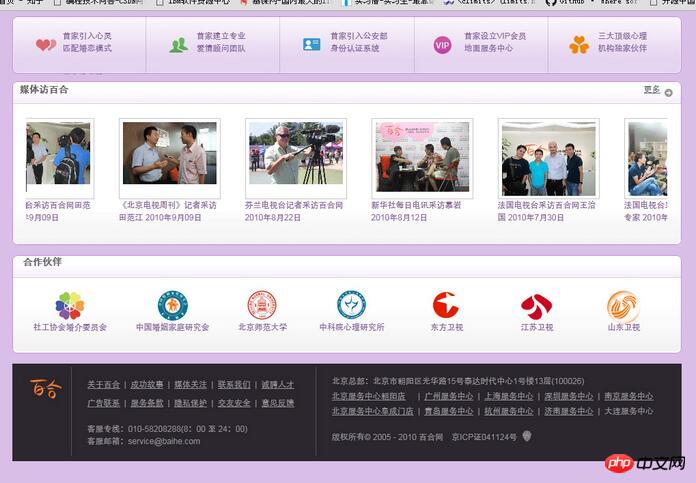One of the methods to develop CSS3 flexible box model
This article mainly shares CSS3 flexible box model development notes with everyone, and introduces compatibility and different attributes. Interested friends can refer to
Flexible Box Model (Flexible Box Moudle), a model used to decide how elements are distributed in a box and to deal with the available space in the box. This is similar to XUL (the user interaction language of the Firefox browser), and other languages use the same box model. Such as XAML, GladeXML, etc. The flexbox model makes it easy to create a fluid layout that adapts to the browser window or a flex layout that adapts to the font size.
Compatibility: The flexible box model specification was released by the W3C standardization organization in 2009. Currently, no mainstream browser supports it, but it uses Webkit and Mozilla rendering engine browsers have customized a set of private properties to support the flexible box model.
Browsers that use the Webkit rendering engine mainly include Safari and Chrome browsers. The engine supports private attributes prefixed with -webkit.
The browsers of Mozilla rendering engine mainly include Firefox browser, which supports private attributes prefixed with -moz.
Related attributes:
box-align: Define the space allocation method of child elements in the vertical direction of the box
box-direction: Define the display order of the box
box-flex: Define the adaptive size of sub-elements in the box
box-flex-group: Define adaptive sub-element groups
box-lines: Define sub-elements to be displayed in columns
box-ordinal-group: Define sub-elements The display position of the element in the box
box-orient: Defines the coordinate axis of the box division
box-pack: Defines the horizontal space allocation method of child elements in the box
box -orient attribute
This attribute can be used to define the flow layout direction inside the box element. When using the flexible box model, you need to first set the display attribute of the parent container to box or inline-box.
Grammar:
box-orient: horizontal | vertail | inline-axis | block-axis | inherit
Simple description of value:
horizontal: box element from Displays its child elements in a horizontal line from left to right.
vertail: The box element displays its child elements in a vertical line from top to bottom.
inline-axis: The box element displays its child elements along the inline axis.
block-axis: The box element displays its child elements along the block axis.
Practical experience: designing multi-column layout
html code:
<p id="box">
<p id="box0"><img src="images/web_01.gif" /></p>
<p id="sub-box">
<p id="box1"><img src="images/web_02.gif" /></p>
<p id="box2"><img src="images/web_03.gif" /></p>
<p id="box3"><img src="images/web_04.gif" /></p>
</p>
</p>CSS3 code:
<style type="text/css">
body{/*文档样式*/
margin:0;padding:0px;/*清除页边距*/
text-align:center;/*文档居中对齐*/
background:#170843;
}
#box{
margin:auto;/*文档居中对齐*/
text-align:center;
width:975px;
}
/*定制各个栏目的宽度*/
#box1{width:185px;}
#box2{width:601px;}
#box3{width:189px;}
/*定制子包含框的盒子显示,其包含的元素水平流动*/
#sub-box{
display:-moz-box;
display:-webkit-box;
display:box;
box-orient:horizontal;
-moz-box-orient:horizontal;
-webkit-box-orient:horizontal;
}
</style>Demonstration effect:

box-direction attribute
The box-direction attribute can change the flow order of internal elements in the box element. The basic syntax of this attribute:
box -direction: normal | reverse | inherit
Simple description of the value:
normal: normal display order, that is, if the box-origent attribute value of the box element is horizontal, then the child elements it contains Displayed in order from left to right, that is, the left side of each child element is always close to the right side of the previous child element; if the box-origent attribute value of the box element is set to vertical, the child elements it contains are arranged in order from top to bottom. Displayed in sequence.
reverse: Reverse display, the display order of the sub-elements contained in the box will be reversed from normal.
inherit: Inherit the display order of superior elements.
Practical experience: Reverse layout web page (based on the above case):
CSS3 code:
<style>
body{
margin:0;padding:0px;
text-align:center;
background:#170843;
}
#box{
margin:auto;
text-align:center;
width:975px;
}
#box1{width:185px;}
#box2{width:601px;}
#box3{width:189px;}
#sub-box{
display:-moz-box;
display:-webkit-box;
display:box;
box-orient:horizontal;
-moz-box-orient:horizontal;
-webkit-box-orient:horizontal;
box-direction:reverse;
-moz-box-direction:reverse;
-webkit-box-direction:reverse;
}
</style>Demonstration effect:

box-ordinal-group attribute
The box-direction attribute can change the flow order of elements inside the box, and the box-ordinal-group attribute can set the position of each child element. The specific display position in the box, the syntax is as follows:
box-ordinal-group:
Value description:
The attribute value is a natural number, starting from 1 Start, used to set the position symbol of the child element. The distribution of child elements will be arranged from small to large according to this attribute value. By default, child elements will be arranged based on the element's position.
Note: If there is no child element with a box-ordinal-group attribute value specified, its serial number defaults to 1, and elements with the same serial number will be arranged in the order in which they are loaded in the document.
Practical experience: vertical web page layout
HTML code:
<p id="box">
<p id="box1"><img src="images/web1_01.gif" /></p>
<p id="box2"><img src="images/web1_02.gif" /></p>
<p id="box3"><img src="images/web1_03.gif" /></p>
<p id="box4"><img src="images/web1_04.gif" /></p>
</p>CSS3 code:
<style type="text/css">
body {
margin:0;
padding:0;
text-align:center;
background:#d9bfe8;
}
#box {
margin:auto;
text-align:left;
width:988px;
}
/*定义盒形显示及盒内元素垂直显示*/
#box {
display : -moz-box;
display : -webkit-box;
display : box;
box-orient:vertical;
-moz-box-orient:vertical;
-webkit-box-orient:vertical;
}
/*根据网页内容的现实需要,借助弹性盒模型调整各个板块的显示顺序*/
#box1 {/*设置第一个元素显示在第二个位置*/
-moz-box-ordinal-group : 2;/*兼容Mozilla Gecko引擎*/
-webkit-box-ordinal-group : 2;/*兼容Webkit引擎*/
box-ordinal-group : 2;/*标准用法*/
}
#box2 {/*设置第二个元素显示在第三个位置*/
-moz-box-ordinal-group : 3;/*兼容Mozilla Gecko引擎*/
-webkit-box-ordinal-group : 3;/*兼容Webkit引擎*/
box-ordinal-group : 3;/*标准用法*/
}
#box3 {/*设置第三个元素显示在第一个位置*/
-moz-box-ordinal-group : 1;/*兼容Mozilla Gecko引擎*/
-webkit-box-ordinal-group : 1;/*兼容Webkit引擎*/
box-ordinal-group : 1;/*标准用法*/
}
#box4 {/*设置第四个元素显示在第四个位置*/
-moz-box-ordinal-group : 4;/*兼容Mozilla Gecko引擎*/
-webkit-box-ordinal-group : 4;/*兼容Webkit引擎*/
box-ordinal-group : 4;/*标准用法*/
}
</style>Demonstration effect

The above is the entire content of this article. I hope it will be helpful to everyone's study. For more related content, please pay attention to the PHP Chinese website!
Related recommendations:
Use CSS3 to realize the cool Black Cat Sheriff homepage
Use CSS to realize pure English numbers Automatic line wrapping
The above is the detailed content of One of the methods to develop CSS3 flexible box model. For more information, please follow other related articles on the PHP Chinese website!

Hot AI Tools

Undresser.AI Undress
AI-powered app for creating realistic nude photos

AI Clothes Remover
Online AI tool for removing clothes from photos.

Undress AI Tool
Undress images for free

Clothoff.io
AI clothes remover

AI Hentai Generator
Generate AI Hentai for free.

Hot Article

Hot Tools

Notepad++7.3.1
Easy-to-use and free code editor

SublimeText3 Chinese version
Chinese version, very easy to use

Zend Studio 13.0.1
Powerful PHP integrated development environment

Dreamweaver CS6
Visual web development tools

SublimeText3 Mac version
God-level code editing software (SublimeText3)

Hot Topics
 How to achieve wave effect with pure CSS3? (code example)
Jun 28, 2022 pm 01:39 PM
How to achieve wave effect with pure CSS3? (code example)
Jun 28, 2022 pm 01:39 PM
How to achieve wave effect with pure CSS3? This article will introduce to you how to use SVG and CSS animation to create wave effects. I hope it will be helpful to you!
 Use CSS skillfully to realize various strange-shaped buttons (with code)
Jul 19, 2022 am 11:28 AM
Use CSS skillfully to realize various strange-shaped buttons (with code)
Jul 19, 2022 am 11:28 AM
This article will show you how to use CSS to easily realize various weird-shaped buttons that appear frequently. I hope it will be helpful to you!
 How to hide elements in css without taking up space
Jun 01, 2022 pm 07:15 PM
How to hide elements in css without taking up space
Jun 01, 2022 pm 07:15 PM
Two methods: 1. Using the display attribute, just add the "display:none;" style to the element. 2. Use the position and top attributes to set the absolute positioning of the element to hide the element. Just add the "position:absolute;top:-9999px;" style to the element.
 How to implement lace borders in css3
Sep 16, 2022 pm 07:11 PM
How to implement lace borders in css3
Sep 16, 2022 pm 07:11 PM
In CSS, you can use the border-image attribute to achieve a lace border. The border-image attribute can use images to create borders, that is, add a background image to the border. You only need to specify the background image as a lace style; the syntax "border-image: url (image path) offsets the image border width inward. Whether outset is repeated;".
 It turns out that text carousel and image carousel can also be realized using pure CSS!
Jun 10, 2022 pm 01:00 PM
It turns out that text carousel and image carousel can also be realized using pure CSS!
Jun 10, 2022 pm 01:00 PM
How to create text carousel and image carousel? The first thing everyone thinks of is whether to use js. In fact, text carousel and image carousel can also be realized using pure CSS. Let’s take a look at the implementation method. I hope it will be helpful to everyone!
 css3 what is adaptive layout
Jun 02, 2022 pm 12:05 PM
css3 what is adaptive layout
Jun 02, 2022 pm 12:05 PM
Adaptive layout, also known as "responsive layout", refers to a web page layout that can automatically recognize the screen width and make corresponding adjustments; such a web page can be compatible with multiple different terminals instead of making a specific version for each terminal. . Adaptive layout was born to solve the problem of mobile web browsing, and can provide a good user experience for users using different terminals.
 How to set animation rotation speed in css3
Apr 28, 2022 pm 04:32 PM
How to set animation rotation speed in css3
Apr 28, 2022 pm 04:32 PM
In CSS3, you can use the "animation-timing-function" attribute to set the animation rotation speed. This attribute is used to specify how the animation will complete a cycle and set the speed curve of the animation. The syntax is "element {animation-timing-function: speed attribute value;}".
 How to achieve height gradient effect in css3
Apr 28, 2022 pm 05:54 PM
How to achieve height gradient effect in css3
Apr 28, 2022 pm 05:54 PM
Implementation method: 1. Use the "element {animation: name time}" statement to bind animation to the element and set the time required for the animation; 2. Use "@keyframes name {100%{height: gradient height value;}}" Statement, set the animation action of height change to achieve the gradient effect.






